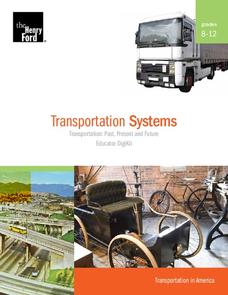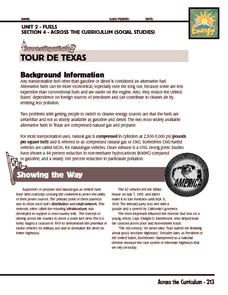PricewaterhouseCoopers
Waste and Recycling: Recycling and Energy Recovery
Reduce, reuse, recycle, and recover. Young environmentalists learn about the overwhelming amount of garbage produced and discover better ways to minimize their impact on Earth by learning the difference between garbage and recyclables.
National Renewable Energy Laboratory
No Fossils in This Fuel
Yeast and sugar go beyond the pantry and into a fuel experiment. Use these common baking ingredients to assist your class in creating ethanol, a natural fuel. Pupils observe the process and gather information to elaborate on the...
Safe Drinking Water Foundation
Water Bottles Everywhere
Young environmentalists examine how water bottle use is polluting the waters on our earth. In groups, your students study the handout on their assigned topic and present their findings to the rest of the class. Leading up to this lesson,...
Safe Drinking Water Foundation
Demonstration of Water Pollution
In this teacher-led demonstration, your young environmentalists will observe and record how different types of water pollutants look when they are combined. From here, individuals will develop a hypothesis on how the water can be...
Safe Drinking Water Foundation
How Water Pollution Is Cleaned Up
As a follow-up from the previous lesson, young environmentalists discuss the benefits of water filtration and whether or not it's the best option. Other alternatives including air stripping, bioremediation, and phytoremediation are...
Safe Drinking Water Foundation
Make Your Own Water Pollution
Using the polluted water that was made in the prior lesson, your young environmentalists will mix pollutants together in an experiment. Then, they will design a water filter that will clean the polluted water to use in the next lesson....
Safe Drinking Water Foundation
Cause and Effect of Water Pollution
Your students will become aware of and be able to list the major types and sources of water pollution. Being able to recognize that the household, agriculture, and industry sectors of society contribute to water pollution, is the main...
Safe Drinking Water Foundation
Types of Water Pollution
In groups, young environmentalists investigate water samples that are contaminated with different types of pollutants. Each group presents their findings to the class and fills out the "Types of Pollutants Chart." This lesson is meant...
Safe Drinking Water Foundation
Water Pollution
An introductory lesson plan to a unit on water pollution, young environmentalists are asked to brainstorm examples of pollutants in water. This lesson plan will help develop a sense of what water pollution is and where the pollutants...
Safe Drinking Water Foundation
Ask an Engineer
A wrap-up to the unit, young environmentalists discuss and write about the difference in perspectives of a water keeper and water treatment engineer.
Cal Recycle
Conserving Natural Resources
Trying to plan an engaging elementary science unit on natural resources? Conserve your energy! This five-part series of lessons and hands-on activities has exactly what you need to teach young scholars about the importance of conservation.
Government of South Australia
Don't Waste Your Energy
Don't lift another finger, this physical and environmental science unit has everything you need to begin teaching your class about energy. Starting with a look at the greenhouse effect, these lessons and activities take young scientists...
Henry Ford Museum
Transportation Systems
Learners analyze the evolution of cultural attitudes through the lens of transportation, examining several artifacts, documents, and photographs. Topics covered include how American attitudes have influenced society's evolution into a...
Berkshire Museum
Where’s the Water?: Acting Out Science Cycles
Young scientists transform themselves into rivers, oceans, clouds, and drops of water in order to explore the water cycle. After assigning and explaining to students their different roles in the activity, the teacher reads aloud a...
Texas State Energy Conservation Office
Investigation: Blowing in the Wind
Using a simulated air sample, environmental or earth science pupils examine the components. You will need to prepare the faux air by using a hole punch and various colors of construction paper. Each color will represent a different...
Texas State Energy Conservation Office
Investigation: Tour de Texas
Teams of Texas tourists gather into groups to analyze what they can do with $50 worth of an alternative fuel. They write checks, keep a balance sheet, and map out their sight-seeing route taking into consideration the location of...
Texas State Energy Conservation Office
Investigation: Gas Laws in Action - Propane
Using helium as an example of propane, physical science middle schoolers experiment with and graph the relationship between temperature and volume in gases. In a whole-class demonstration, they show how molecules behave under different...
Texas State Energy Conservation Office
Investigation: Conservation of Energy
By rolling marbles down a six-foot length of track, physical scientists determine how much energy is lost to heat. It is recommended that you opt for the foam pipe insulation track because more friction slows the marble, allowing...
Texas State Energy Conservation Office
Investigation: Oil Recovery
Energy conservers investigate gravel size to discover if it impacts the amount of oil recovered in the extraction process.
Texas State Energy Conservation Office
Are Your Computers Wasting Energy?
After reading about the amount of energy that is used to power a personal computer, learners take a look at their own computer use and therefore, their energy consumption. They do this through a series of questions and computations on...
Environmental Protection Agency (EPA)
How Much Water Do You Use?
Incorporate reading strategies, math, research, and the scientific method into one lesson about water conservation. After reading a story about a landlady trying to determine how many people are living in an apartment, learners develop a...
Staten Island Zoo
The African Savanna
Are you thinking about taking your class to the local zoo? Kids of all ages love visiting exotic animals in order to learn about biodiversity, habitat, and animal adaptations. Here is a 44-page activity guide that provides educators with...
PricewaterhouseCoopers
Conservation: Water
Here is a fantastic experiment-based lesson on water conservation, waste, and filtration. The lesson plan is well-developed and provides background information, discussion leads, and six scripted lab activities anyone can do. The class...
Curated OER
Ladybugs, Ladybugs, Ladybugs
Those lovely ladybugs are so cute, and so very useful! Use a short unit to explore insect anatomy, the ladybug life cycle, and the help ladybugs provide organic farmers. The unit is comprised of four short thirty-minute lesson plans that...

























